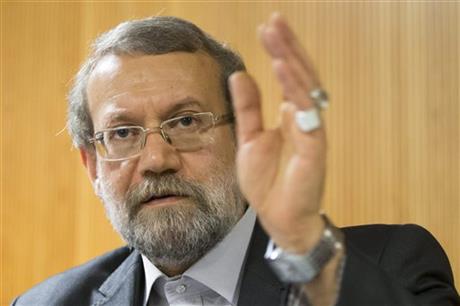
By JOHN HEILPRIN
Iran’s Parliament speaker Ali Larijani answers a question during a press conference on the sidelines of the 129th Assembly of the Inter-Parliamentary Union (IPU), in Geneva, Switzerland, Wednesday, Oct. 9, 2013. (AP Photo/Keystone, Salvatore Di Nolfi)
GENEVA (AP) — Iran has more enriched uranium than it needs and plans to use that as a bargaining chip at nuclear talks in Geneva next week, Iranian Parliament Speaker Ali Larijani said Wednesday.
In an Associated Press interview, Larijani said the surplus uranium would be discussed with Western powers in the context of whether it will halt its enrichment of uranium to 20 percent, which has been a key concession sought in the negotiations.
“Through the process of negotiations, yes, things can be said and they can discuss this matter,” he said, on the sidelines of a meeting of the world organization of parliaments.
The 20-percent-enriched uranium is much closer to warhead-grade material than the level needed for energy-producing nuclear reactors, but Larijani says it needs the higher enrichment solely for energy, research and isotopes for medical treatments, not for nuclear weapons.
He said Iran produced the enriched uranium itself because the U.N.’s International Atomic Energy Agency would not provide it.
“But we have some surplus, you know, the amount that we don’t need. But over that we can have some discussions,” he said.
Iran plans to negotiate over its nuclear program next week with the U.S., Russia, China, Britain, France and Germany. The U.S. and its allies accuse Iran of using its civilian nuclear program as a cover to develop nuclear weapons.
President Barack Obama disclosed in an AP interview last Friday that U.S. intelligence agencies believe Iran continues to be a year or more away from building a nuclear weapon, in contrast to Israel’s assessment that Tehran is much closer.
Obama and Iranian President Hassan Rouhani also have become the first U.S. and Iranian leaders to have direct contact in more than 30 years, which Larijani acknowledged has upset some hard-liners in Iran.
“They are a little bit pessimistic about it, suspicious. So, they have their own sway, and they put pressure, but we do support Mr. Rouhani. And God willing, he will have the parliament’s support (in the nuclear talks),” Larijani said.
Larijani, formerly Iran’s former top nuclear negotiator, said he believes there will be no progress next week unless the U.S. offers to curtail some of the West’s crippling economic sanctions against Tehran.
He said “it is too soon to pass any judgment” on whether U.S.-Iranian diplomatic ties might be restored. Switzerland now represents U.S. diplomatic interests in Iran.
The countries broke ties after the 1979 Islamic Revolution when mobs stormed the U.S. Embassy in Tehran. A total of 52 hostages were held for 444 days.



